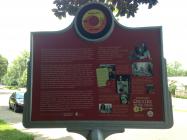Inscription
Front
Born Roberta Lee Streeter in Chickasaw County (1944) and spending her childhood here, Bobbie Gentry brought the accents, sounds and images of Delta life into scores of haunting songs she wrote and records she made, to become one of the most influential country and pop artists of the 1960s and ?70s. With her phenomenal Number One hit "Ode to Billie Joe" and complex, innovative albums such as The Delta Sweete, she brought the sultry musical flavors of Mississippi country to the world.
Rear
Bobbie Gentry Although in interviews she granted, Gentry gave her birth name as Roberta Lee Streeter and the year as 1944, she was actually born on her family Chickasaw County farm near Woodland on July 27, 1942, as Bobby Lee Streeter. Her parents divorced when she was very young, and she was raised there by her Streeter grandparents until she entered school here in Greenwood, where her father resided. Attracted to blues, country and particularly gospel music even as a child, she taught herself to play piano by observing the church choir pianist and was writing songs by the age of seven. Gentry, reared in poverty, later referred to her rural upbringing as a privilege, and worked the flavors and rhythms of the Delta into the heart of her music.
She moved to California to live with her mother at thirteen, taught herself guitar, banjo, and bass, and took the stage name Bobbie Gentry, after the rags-to-riches backwoods young woman in the Hollywood film Ruby Gentry. While in high school in Palm Springs, the stunning and notably bright young woman began appearing in local clubs and was briefly a chorus dancer in Las Vegas. After graduation she enrolled at UCLA where she pursued a degree in philosophy and studied music theory at The Los Angeles Conservatory of Music. In 1963 she recorded and cowrote several songs with Jody Reynolds. In 1967 Capitol Records heard her demo tape of original songs and signed her to the label; the first single was intended to be the smoky, rhythmic "Mississippi Delta," but disk jockeys were attracted to her mysterious ballad on the other side, "Ode to Billie Joe." It sold three million copies, reaching the Top Twenty in country, and the album by the same name topped both country and pop charts. She was a host of the first Country Music Association Awards ceremony a few months later.
Her albums The Delta Sweete and Local Gentry in 1968 and Fancy and Patchwork in 1970 offered striking, original southern gothic ballads and lush, pop musical settings of her own devising, but were only marginally successful. She returned to the Top Twenty in country and pop with duet versions of the Everly Brothers? "Let It Be Me," in 1968 and "All I Have To Do Is Dream" in 1969, recorded with Glen Campbell. Already a frequent television variety show guest performer, her pop success in England with "I?ll Never Fall in Love Again" led to starring in her own series there in 1969 and a U.S. series in the summer of 1974. In 1976, she re-recorded her most celebrated song for the Ode to Billy Joe Robby Benson movie inspired by it. She married twice during her years of stardom, to casino operator Bill Harrah, then to singer Jim Stafford, with whom she had a son. Gentry retired from performing and public life in 1982.
Details
| HM Number | HM1GNY |
|---|---|
| Series | This marker is part of the Mississippi: Mississippi Country Music Trail series |
| Tags | |
| Marker Number | 24 |
| Year Placed | 2013 |
| Placed By | The Mississippi Country Music Trail, U.S. DOT(FHA), & MS DOT. |
| Marker Condition | No reports yet |
| Date Added | Sunday, September 28th, 2014 at 6:56am PDT -07:00 |
Pictures
Locationbig map
| UTM (WGS84 Datum) | 15S E 760613 N 3714562 |
|---|---|
| Decimal Degrees | 33.53891667, -90.19343333 |
| Degrees and Decimal Minutes | N 33° 32.335', W 90° 11.606' |
| Degrees, Minutes and Seconds | 33° 32' 20.1" N, 90° 11' 36.36" W |
| Driving Directions | Google Maps |
| Area Code(s) | 662, 601 |
| Which side of the road? | Marker is on the right when traveling North |
| Closest Postal Address | At or near 600-806 Co Rd 518, Greenwood MS 38930, US |
| Alternative Maps | Google Maps, MapQuest, Bing Maps, Yahoo Maps, MSR Maps, OpenCycleMap, MyTopo Maps, OpenStreetMap |
Is this marker missing? Are the coordinates wrong? Do you have additional information that you would like to share with us? If so, check in.
Nearby Markersshow on map
Show me all markers in: Greenwood, MS | Leflore County | 38930 | Mississippi | United States of America
Maintenance Issues
- What historical period does the marker represent?
- What historical place does the marker represent?
- What type of marker is it?
- What class is the marker?
- What style is the marker?
- This marker could use another picture or two.
- Can this marker be seen from the road?
- Is the marker in the median?

Comments 0 comments